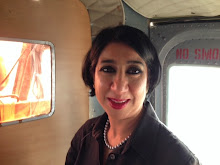Sunday, 21 August 2011
The first time ever on British television; the Life of The Prophet
Three one hour television documentaries for a series called “The Life of Muhammad” were on BBC Two recently. It was the first time that British television had shown a biography on the Prophet, whose message forms the religious base for one and half billion people round the world.
Filmed on location in Saudi Arabia, Jerusalem, Turkey, the USA, the UK and Jordan, all the drama, tragedy and triumph of the epic narrative of the life and teachings of one of the most important religious figures of all time was laid out for the viewer. One of the biggest names on the subject was part of the production team; author, scholar and broadcaster Ziauddin Sardar wrote the whole series.
The documentaries traveled to the place of the Prophet’s birth, and re-traced his actual footsteps from his early years in Mecca, his struggles with accepting his Prophetic role, his flight to Medina, the founding of the first Islamic constitution, his successes and failures, militarily and politically, through to his death and his legacy.
Mr Sardar, who agreed to be interviewed by email, said that non-Muslims could “learn a lot …and get a thrilling story as a bonus” –while Muslim viewers might discover things from the series that they did not know before. He said, “We based the film on classical biographies –particularly Ibn Ishaq’s Life of the Prophet, regarded by all Muslims as the first and most authentic biography.” The program makers interviewed with, among others, John L. Esposito, professor of religion, international affairs and Islamic Studies at Georgetown University, H.R.H. Princess Badiya El Hassan of the Jordanian Royal family, author Karen Armstrong and Sajjad Rizvi, associate professor of Islamic intellectual history, Exeter university.
Mr Sardar explained that he wanted to show that the details of the life of the Prophet are alive and vivid for Muslims today, so image sometimes contrasted with narrative. “We often used contemporary scenes and related them back to the time of the Prophet.”
The first episode, which got 1.8million viewers, was acclaimed for its sensitivity and intelligence in dealing with the visual challenge of finding ways of talking about the Prophet without depicting him. (Depictions of the Prophet are not allowed in Islam).
“Another challenge was to get the balance right, and ensure that the diversity of Islam, and all the different views – from the orthodox to the liberal, Sunni, Shia, Sufi, as well as western critics, and the voices of women –are all represented…we had a Shia consultant, an established scholar in the field, who advised us and made sure we took his views into account. Yet another challenge was to explore how Muslims today use the Prophet as a model, how close or [how]far they are to the spirit of his life. It was like walking a tightrope”
In keeping with Mr Sardar’s back catalogue of books and television programs, authenticity and respect were hallmarks of the series. “We took particular care to be respectful to the Prophet. As Muslims we could not do otherwise.”
Mr Sardar wrote all of the presenter’s links, including the introduction, in which the narrator said “Peace be upon him” after the name of the Prophet. It set the tone of the films.
“But we also had to deal with the controversial aspects of his life fairly and objectively. So we took particular care both to be deeply respectful and honest in our treatment of difficult subjects.” Using excellent sources and referring to them constantly gave the series an authoritative platform.
The writer’s role in this series cannot be overstated, for it is through the words and stunning images that programs about the past can work best. “The Life of Muhammad” is the first biographical documentary that not only features no visual images of its subject; it also has no dramatic reconstructions of the subject’s life. Strong landscapes, art and architecture accompanied by atmospheric music work well with the powerful narrative and set a benchmark which led one Guardian reviewer to write; “Visually at least, many television directors should consider converting to Islam.”
Subscribe to:
Post Comments (Atom)


No comments:
Post a Comment